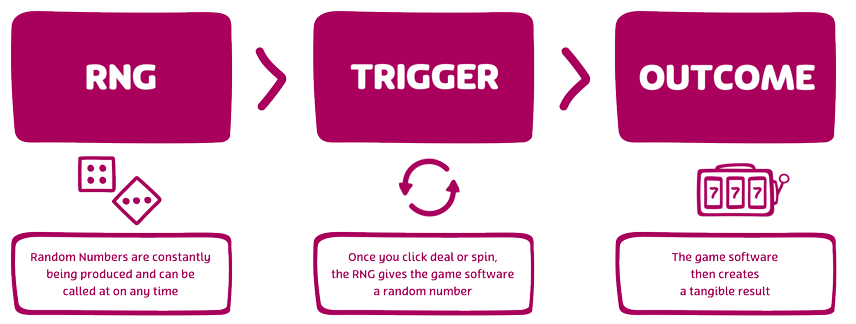Safer Gambling at PlayOJO
How Games Work?
Random Number Generators (RNGs) are used in software-based versions of Slots, Blackjack, and Roulette to ensure that every wheel spun, dice rolled, and card dealt is completely random and unpredictable. RNGs are thus critical for making games fair and honest. The game generates a string of random numbers the moment it is loaded. This sequence is constantly moving and will not stop until you press the button. When the button is pressed, the sequence is interrupted and a random number is converted into a distinct outcome – the reels stopping, a card being dealt, the winning pocket on a roulette wheel, and so on. Independent regulators test RNGs, and casino sites that fail these tests will not be granted an operating license.
Live games, on the other hand, use real human dealers and croupiers, real cards, and real tables. As a result, RNGs cannot be used to generate fair outcomes. Live card games, on the other hand, use a freshly shuffled deck of cards for each hand to prevent card counting and other exploitative strategies. Of course, the outcomes of live games are still 'random,' but not as random as a true RNG.

Common Misconceptions About Gambling
You can avoid losing more than anticipated by distinguishing between gambling facts and myths.
People frequently have erroneous or mythical beliefs about gambling. Belief in lucky numbers, rituals, or the ability to influence the outcome of a game can all lead to problems.
Here are some common myths and their debunkings.
“If I keep playing, I will eventually get lucky and win back all the money I’ve lost”
The outcome of each bet is completely independent of the previous one. That is, the odds are no better on the tenth bet than they were on the first bet. The more you risk, the more you lose over time.
“If I play multiple slot machines, I have a higher chance at winning”
You may win more often if you play two slot machines or poker games at the same time, but you will also spend more and ultimately lose more. Remember that the more you gamble, the more you lose over time.
“Gambling can be a good source of income”
Gambling should be regarded as a form of recreation.
Gambling entails putting money at risk on an event or game with uncertain outcomes. As a result, should be regarded as a pleasurable pastime rather than a source of revenue.
Availability depends on your country
















We use both automated and manual processes in order to verify the age of the customer registering the account and any player under the age of 18 who registers an account will have their account closed immediately.
We say NO to Underage Gambling. We do not allow players under the age of 18 to gamble. This is stated in our Terms and Conditions.
Trademark ™ 2026 PlayOJO. All rights reserved.
This site’s operations are regulated by the Alcohol Gaming Commission of Ontario (AGCO) and is operated by SkillOnNet Ltd, Office 1/5297 Level G, Quantum House, 75, Abate Rigord Street, Ta’ Xbiex, XBX 1120, Malta, under an AGCO Internet Gaming license and pursuant to an agreement with iGaming Ontario.
Gambling can be addictive, please play responsibly.
Please note that all game images and provider icons displayed on the logout page are for illustrative purposes only. Some of the games shown may not be live or available on the logged-in platform for your country or account.
Apple and the Apple logo are trademarks of Apple Inc., registered in the U.S. and other countries. App Store is a service mark of Apple Inc., registered in the U.S. and other countries.
